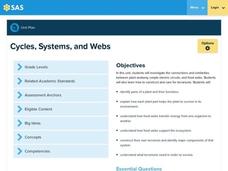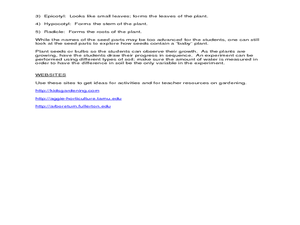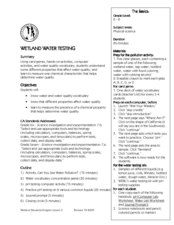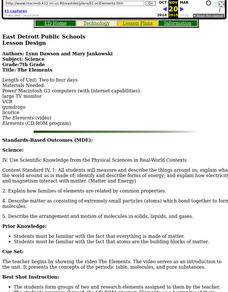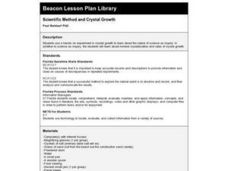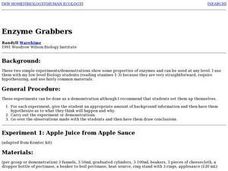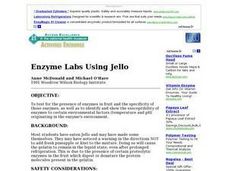Curated OER
Cross-Linked Polymer Lab
Students use short-chain polymers and borate ions to produce cross-linked polymers in the lab. In this cross-linked polymer lesson plan, students produce polyvinyl acetate slime and polyvinyl alcohol slime and test their physical...
Curated OER
World of Plastics and Polymers
Students investigate plastics and learn they are giant molecules made of carbon atoms. In this polymers and plastics lesson, students perform 3 activities which all include making polymers from household items such as milk and vinegar,...
Curated OER
Ziplock Chemistry
Students investigate various chemical reactions when creating mixtures in ziplock baggies. In this chemistry lesson, students will recognize various chemical reactions and cite evidence. Safety and assessment strategies are included in...
Curated OER
Kelvin Temperatures and Very Cold Things!
In this Kelvin temperature scale activity, high schoolers solve 6 problems using the equations for the conversion of Centigrade to Fahrenheit and Kelvin to Centigrade. They convert between Fahrenheit and Kelvins and Centigrade and Kelvins.
Curated OER
Mini Rockets
Students explore gases. For this chemical energy lesson, students will observer chemical reactions and infer a conclusion about reaction producing gasses.
Curated OER
Building a Terrarium System
Learners create their own terrariums. In this ecological model lesson, students create terrariums using soil, seeds, pebbles, and two liter bottles. Learners compare the elements of a terrarium to a food web.
Curated OER
Seeping Stones
Students explore and experiment with oil traps in rocks. In this rocks lesson plan, students explore the porousness of different rocks and how the more porous a rock is, the more oil it can trap. Students also participate in a lab step...
Pennsylvania Department of Education
Cycles, Systems, and Webs
Fourth graders review the parts of the plant and their functions. In this plant lesson plan, 4th graders recognize that plants must transfer energy to make food. Students understand the interdependence of organisms in an ecosystem.
Pennsylvania Department of Education
The Digestive System
Fourth graders simulate how the digestive system works. In this hands-on simulation, 4th graders complete six group activities that help students visualize how our body breaks down food into nutrients.
Curated OER
Electricity: Will It Conduct?
Students build conductivity testers and investigate which solids and solutions conduct electricity. Working in groups, they predict which items will conduct electricity and record their answers on worksheets.
Curated OER
Hunting for Aqueous Solutions
For this aqueous solutions worksheet, students will conduct an experiment to determine the solubility of different common kitchen items. Students then complete 3 short answer questions.
Curated OER
Absolute Zero Lab
In this absolute zero worksheet, students experiment with a closed-end syringe and a ice bath and boiling water. They record volumes of gases in the syringe as well as temperatures of the water and they plot their experimental data. They...
Curated OER
Under Pressure
For this pressure worksheet, students read about Dalton's Law of Partial Pressure, about vapor pressure and about collecting gases over water. They answer 6 questions using the concepts of Dalton's Law of Partial Pressure and they solve...
Curated OER
Models of Planets
In this planet models worksheet, students use the radius of a given planet and its mass to answer questions using a model of a planet with a given radius. They determine the volume of the planet's inner core, the volume of its outer...
Curated OER
Observing Reactions
Students use the scientific method to complete to experiments that have visible reactions. In this visible reaction lesson, students participate in an experiment with melting ice and one with inflating a balloon. Students record their...
Discovery Science Center
Kindergarten Observing, Comparing and Contrasting
Although this is a science lesson, it can be adapted to help meet Common Core standards in math as well. Starting scientists describe physical properties of objects and explore three forms of water. To address the Common Core, they can...
Curated OER
Wetland Water Testing
Students examine the different properties that affect water quality. In this pollution lesson students play a game, complete a hands on activity and computer lab.
Curated OER
The Elements
Young scholars watch video, The Elements, research information about elements using both the Internet and CD-ROM program, and create atoms out of gumdrops and licorice.
Curated OER
Scientific Method and Crystal Growth
Students conduct a hands-on experiment growing crystals to demonstrate the nature of science as inquiry. They discuss and test variables that affect crystal growth. They research mineral crystallization and mineral formation on the...
Curated OER
Kids Conserve? Water Preserved
Sixth graders review the steps of the water cycle. Individually, they calculate the amount of water they use in a day and identify ways they can conserve. As a class, they discuss how conserving water today helps future generations and...
Curated OER
Enzyme Grabbers
Students perform two experiments to show the properties of enzymes. They use pectinase to produce apple juice from applesauce to show enzyme action and then taste the difference between raw and boiled papaya seeds as evidence of enzyme...
Curated OER
Enzyme Labs Using Jello
Students test for the presence of enzymes in fruit and the specificity of those enzymes, as well as to identify and show the susceptibility of enzymes to certain environmental factors (temperature and pH) originating in the enzyme's...
Curated OER
Asphalt Lab
Students are introduced to basic engineering principles, road construction and material science. They explore how material properties and strength can be affected. Students become Civil Engineers by both creating Asphalt cookies and by...
Curated OER
Oobleck, Goop, and Glurch
Sixth graders use teacher prepared samples of substances. They perform the same observations and complete charts for each substance. After recording and analyzing their results, 6th graders make changes in the recipes to create a better...
Other popular searches
- Liquid Measurement Chart G
- Liquid Measurement Chart
- Volume Liquid Measurement
- Liquid Measurement Activity
- Standard Liquid Measurement
- Liquid Measurement Tools
- Liquid Measurement in Math
- Metric Liquid Measurement
- Liquid Measurement Chart G"4
- Liquid Measurement Worksheet
- Using Liquid Measurement
- Liquid Measurement Gill









